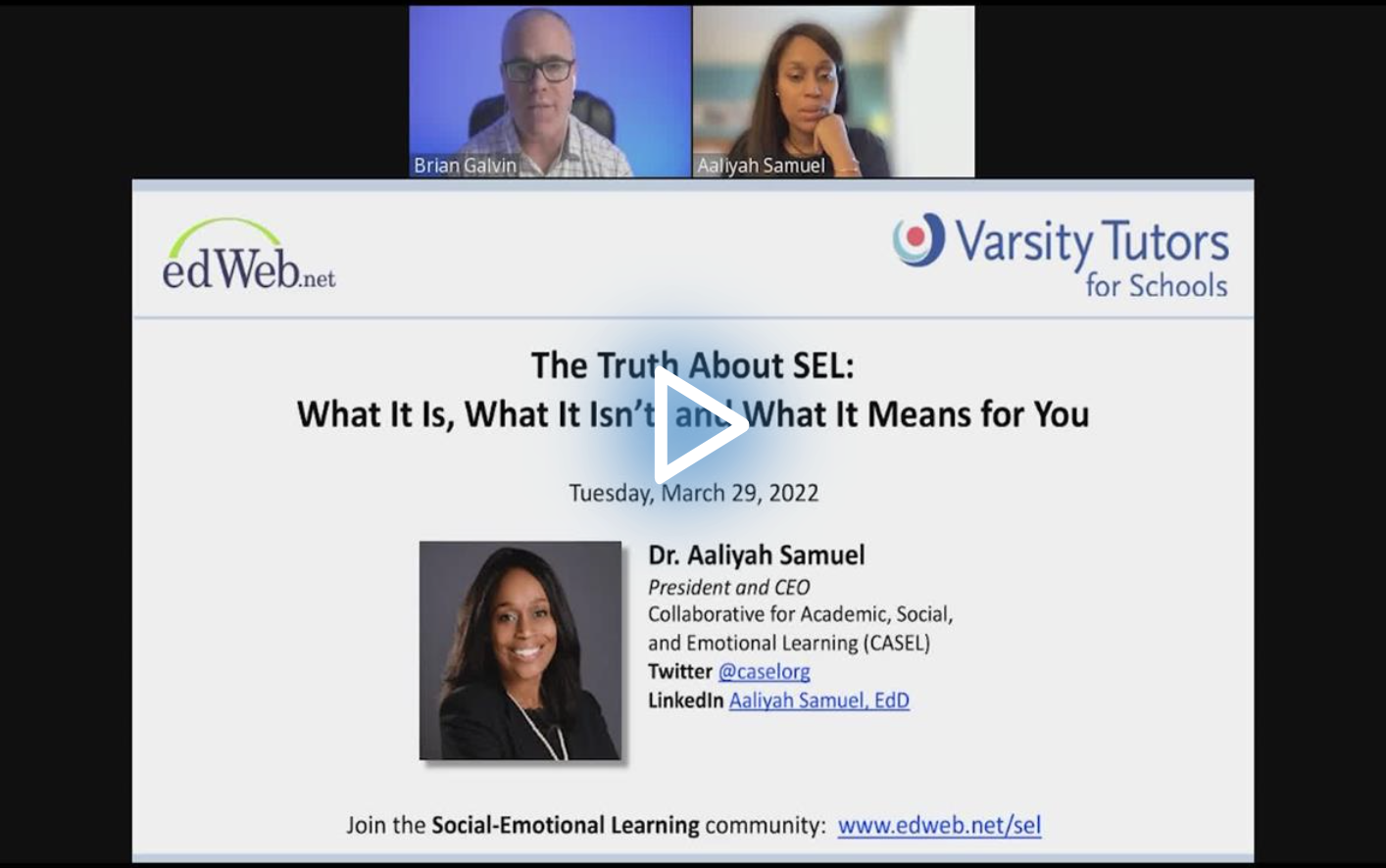The Keys to an Effective SEL Program
Watch the Recording Listen to the Podcast
For years, educators were talking about social-emotional learning (SEL) and how to boost students’ skills. But after the lockdown and a year out of the classroom, SEL has become the favorite buzzword outside of school walls. SEL isn’t mental health services for students or a one-time fix to help with learning loss, though.
During the edLeader Panel, “The Truth About SEL: What It Is, What It Isn’t, and What It Means for You,” Dr. Aaliyah Samuel, President and CEO of Collaborative for Academic, Social, and Emotional Learning (CASEL), explained what SEL is, the benefits, and what it looks like in schools when implemented effectively.
First, according to Dr. Samuel, SEL is a lifelong process of learning how to better understand ourselves, how to connect to people, how to achieve goals, and how to serve the community. The CASEL Framework, also known as the CASEL Wheel, features five competencies that help support student learning and development: self-awareness, self-management, social awareness, relationship skills, and responsible decision-making.
All of these skills together can support college and career readiness, healthy relationships, and academic achievement. In addition, the Wheel emphasizes partnerships and the need for the administrators, teachers, students, parents/families, and the larger community to work together to build SEL capabilities.
Successful SEL programs provide students with four key benefits.
- Leads to improved academic outcomes – learning is an emotional process, and when students learn to recognize and regulate their emotions, they can focus on their schoolwork.
- Provides global, long-term benefits beyond the classroom – SEL skills aren’t just useful at school. We can’t even imagine the careers or what life will look like for students in 2030, but we can prepare them with problem-solving and relationship-building abilities that can help them succeed.
- Wise financial investment – the benefits of an effective SEL program multiply as students make their way through the district and into the community.
- Improves lifetime outcomes – and because of the improved academic outcomes, students have more opportunities post K-12 and are more prepared for new challenges.
Next, Dr. Samuel emphasized that effective SEL programs are integrated throughout schools and districts. Key characteristics include explicit SEL instruction as well as SEL integrated into the curriculum, supportive discipline, a focus on adult SEL as well as the students, and partnerships with the family and the community.
CASEL identifies four focus areas for implementation.
- Organize: Build support for SEL throughout the school community—don’t just drop the curriculum on the teachers’ desks.
- Strengthen Adult SEL: Cultivate a trusting community and a supportive environment for the adults so they can benefit from SEL practices as well as model them for the community.
- Promote SEL for Students: Make SEL part of the daily experience of students at school both in and out of the classroom and partner with parents and community members.
- Improve: Aim for specific goals and make sure you’re collecting information on how to track and reach those goals as well as reflecting on how to make the program stronger.
Finally, Dr. Samuel advised educators to research any SEL program before they commit to it. Effective programs are evidence based and have a specific protocol or program to implement them successfully.
Moreover, schools need to follow the implementation instructions—they need to lean into what is working. Most important, SEL shouldn’t be part of just one class or one grade. The programs with the highest returns are the ones that span K-12.
Learn more about this edWeb broadcast, “The Truth About SEL: What It Is, What It Isn’t, and What It Means for You,” sponsored by Varsity Tutors for Schools.
Watch the Recording Listen to the Podcast
Join the Community
Social-Emotional Learning is a free professional learning community where educators can collaborate and share ideas, examples, and resources for incorporating social-emotional learning in the classroom.
Varsity Tutors for Schools is your all-in-one live learning platform that delivers personalized live learning to every student in your school district. Whatever challenges your students face, our proven solutions can be customized to meet their needs. Provide equitable access to everything from 1-on-1 tutoring to adaptive assessments.
Blog post by Stacey Pusey, based on this edLeader Panel






Comments are closed.